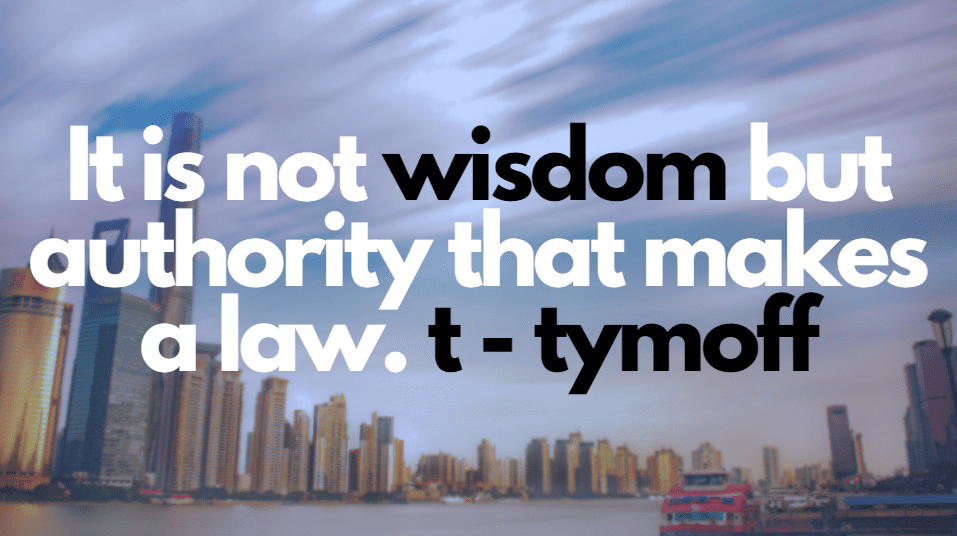In the world of jurisprudence, the saying, “It is not wisdom but authority that makes a law,” has sparked numerous debates and discussions. This thought-provoking quote by Thomas Hobbes, often abbreviated as “t – tymoff,” delves into the complex relationship between the source of law and its legitimacy. In this article, we will explore the profound meaning behind this statement and dissect its implications in the realm of governance and society.
Understanding the Quote
The Role of Authority in Lawmaking
At the heart of this quote lies the concept that laws are not solely shaped by wisdom or rationality, but by the authority vested in those who create them. To truly grasp this notion, we must delve into the components that constitute the authority of law.
The Historical Context
To comprehend the origins of this saying, we need to journey back in time to when Thomas Hobbes lived. What historical events and societal conditions influenced his perspective on law and authority?
The Paradox of Wisdom and Authority
Intriguingly, this quote suggests a paradox: wisdom, often associated with sound judgment, may not always be the driving force behind legal decisions. How does authority sometimes overshadow wisdom in the making of laws?
Implications for Modern Governance
Let’s bring this age-old wisdom into the modern context. How does this perspective impact contemporary governance systems, especially in democracies where the rule of law is considered paramount?
The Authority Behind Laws
Authority in lawmaking is a multifaceted concept. It encompasses both the individuals who create laws and the institutions that uphold them. Authority often derives from various sources, such as:
- Legislative Bodies: Elected representatives and lawmakers wield authority when they draft, debate, and pass laws on behalf of the people.
- Executive Power: Presidents, prime ministers, or monarchs have authority to enforce laws and, in some cases, issue executive orders.
- Judicial System: Judges interpret and apply laws, making them authoritative figures in the legal process.
- Constitutional Frameworks: Constitutions establish the fundamental principles and rules of a nation, giving them unparalleled authority in shaping laws.
Historical Perspective
To appreciate the quote fully, we must consider its historical context. Thomas Hobbes, a philosopher of the 17th century, lived during tumultuous times marked by civil wars and political upheaval. His observation may have been influenced by the chaotic events of his era, where authority often prevailed over wisdom in the formation of laws.
The Paradox Unveiled
The paradox embedded in the quote highlights a critical aspect of lawmaking. While wisdom and rationality should ideally guide legal decisions, authority can sometimes take precedence. This can occur for several reasons:
- Political Expediency: Lawmakers may prioritize decisions that secure their political careers rather than those that are inherently wise.
- Social Pressure: Public opinion and societal trends can push authorities to make laws that appease the majority, even if they lack wisdom.
- Historical Precedent: The weight of tradition and existing laws can exert authority over the creation of new ones, stifling innovation and wisdom.
Modern Governance and the Authority-Wisdom Balance
In today’s world, where democracies and constitutional frameworks prevail, the balance between authority and wisdom is a constant concern. It is essential to strike a harmonious equilibrium, allowing for the incorporation of both wisdom and authority in lawmaking.
Conclusion
In conclusion, the saying, “It is not wisdom but authority that makes a law,” by Thomas Hobbes, invites us to reflect on the intricate relationship between authority and wisdom in the realm of law. While wisdom should ideally guide the creation of just and fair laws, authority often plays a significant role. This quote serves as a reminder that in the complex world of governance, the interplay between these two elements can shape the legal landscape profoundly.
5 Unique FAQs
1. Who was Thomas Hobbes, and why is his quote significant? Thomas Hobbes was a renowned philosopher whose quote highlights the balance between authority and wisdom in lawmaking, sparking discussions on the legitimacy of laws.
2. Can you provide examples of laws where authority overshadowed wisdom? Prohibition laws in the United States in the 1920s, driven by social pressure and authority, are often cited as an example.
3. How can modern societies ensure a balance between wisdom and authority in lawmaking? Transparency, accountability, and public participation are crucial in maintaining this balance.
4. Are there instances where wisdom prevails over authority in lawmaking? Yes, some landmark laws have been created based on ethical and moral wisdom, even when met with resistance from authorities.
5. What can individuals do to promote wise lawmaking in their communities? Engaging in civic activities, advocating for ethical governance, and participating in the democratic process are effective ways to influence wise lawmaking.





